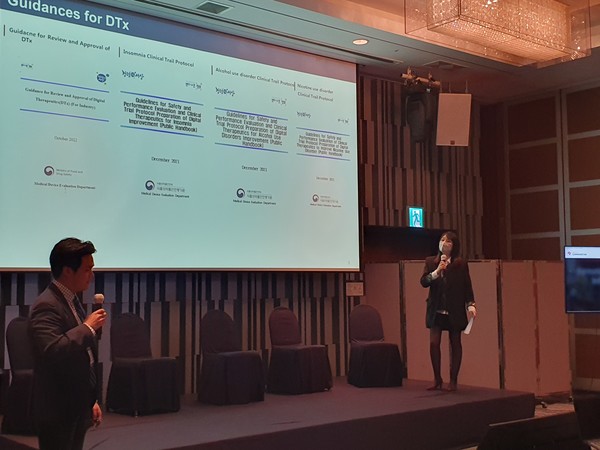A Korean government official in charge of reviewing digital health devices outlined three major criteria for the regulator’s review of digital therapeutics (DTx) products at DTx Asia in Seoul on Tuesday.
In the afternoon session of DTx Asia, Han Young-min, Assistant Director of Digital Health Devices Division of the Ministry of Food and Drug Safety (MFDS), presented the regulatory guidance regarding DTx in Korea.

According to the MFDS, DTx is defined as an intervention delivered directly to patients that is evidence based and targets prevention control and treatment for medical disease and conditions and can be used independently or paired with existing treatments.
In the DTx area, the regulator reviews on software as a medical device (SAMD), AI-based medical devices, DTx and related cybersecurity.
The ministry also supports commercialization and post marketing, she added.
Han outlined three criteria for DTx consideration by the MFDS.
The first consideration should determine whether a device has software embedded in PC, mobile products, hardware for general purpose to classified as SAMD, Han said.
Next, she stressed the importance of the application scope to discern whether it can be used for prevention, management or treatment where the disease conditions must be identified by International Classification of Diseases (ICD) or Korean Standard Classification of Disease (KCD).
Lastly, she highlighted that the therapeutic’s mechanism of action should be supported by clinical practice guidelines, other peer reviewed journals or pilot studies.
Han added that the MFDS is currently working together with the International Medical Device Regulators Forum (IMRDF) and hoping to expand their work with the FDA to develop more guidelines for the development of the DTx industry domestically and globally.
The MFDS has yet to approve any DTx product.
However, as of October, 15 companies submitted clinical trial protocols and their study plans were approved for insomnia, general anxiety disorder and alcohol use disorder indications.
Korea has moved swiftly in DTx regulations, publishing its first guideline in August 2020.
In 2021, the MFDS published clinical trial protocol examples for products containing treatments for chronic insomnia and alcoholism disorder.
“We also plan to publish guidelines specifically for general anxiety disorder,” Han said.
Digital Therapeutics Alliance (DTA) Chief Policy Officer Megan Coder commended South Korea for its work in the regulation of DTx stating.
“Korea has been instrumental in defining DTx as SAMD and our organization together with other countries which we support, have followed Korea’s lead and are looking forward to future steps from Korea,” Coder said.

